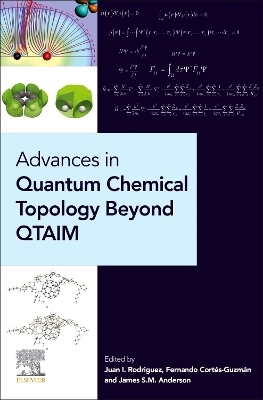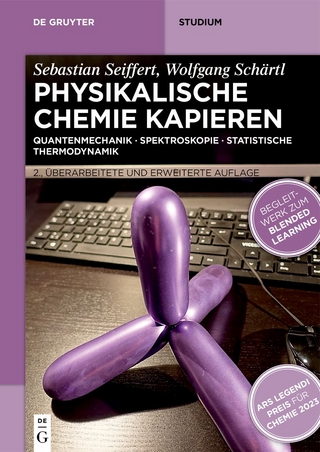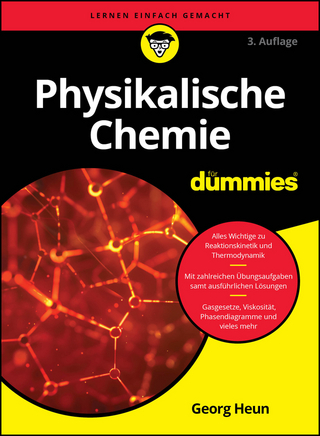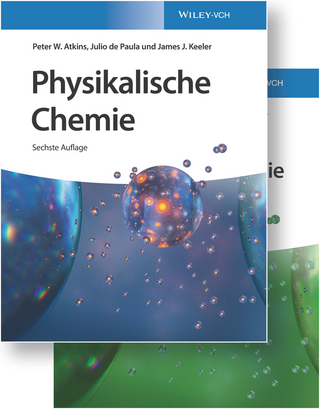
Advances in Quantum Chemical Topology Beyond QTAIM
Elsevier - Health Sciences Division (Verlag)
978-0-323-90891-7 (ISBN)
Drawing together the knowledge of key authorities in the area, this book provides a comprehensive, pedogeological guide to this insightful theory for all those interested in modelling, exploring and understanding molecular properties.
Juan I. Rodríguez is a full professor at Instituto Politécnico Nacional-México since 2014. He obtained his PhD in quantum chemistry under the supervision of Prof. Paul Ayers developing efficient Density Functional Theory (DFT) numerical methodologies. He also worked with Prof. Richard Bader as a postdoctoral research assistant focusing on developing high performance algorithms for computing Bader’s QTAIM properties of “big CPU-time-prohibiting systems. These methods were implemented in the “Amsterdam Density Functional package (ADF). Currently prof. Rodríguez and his research group uses DFT-QTAIM based calculations to study materials for technological applications in organic solar cells, hydrogen evolution catalyst, virus biosensors, water pollution, etc. Fernando Cortés-Guzmán is a full professor at the Instituto de Química, Universidad Nacional Autónoma de México since 2008. He received his Ph.D. under Dr. Gabriel E. Cuevas González Bravo at UNAM. He also worked with Prof. Richard Bader as a postdoctoral research assistant focusing Metal-Ligand interactions. He focuses on the study of the evolution of specific interactions throughout a chemical process, both in the basal and excited state, using the local and integrated properties of scalar fields in order to understand and predict reactivity and molecular recognition. James S. M. Anderson is an associate professor at Instituto de Química, Universidad Nacional Autónoma de México since 2019. He received his Ph.D. under Prof. Paul W. Ayers at McMaster University where he developed algorithms for finding exact solutions for the equations appropriate for quantum chemistry. He completed a postdoctoral stays with Prof. Takaharu Otsuka at the University of Tokyo, Prof. Wenjian Liu at Peking University, Dr. Seiji Yunoki at RIKEN, and Prof. Koichi Yamashita at the University of Tokyo. Currently Prof. Anderson and coworkers carry out research in: 1) Developing methods that accurately approximate the electronic structure of atoms, molecules, clusters, and chemical systems. 2) Developing computational facile models that provide intuition into a molecules or chemical system, with a strong preference for models that are derived directly from formal mathematics. 3) Using mathematical theorems and analytic solutions to model equations to gain insight into chemistry.
1. Introduction to QTAIM and beyond Fernando Cortés-Guzmán, Juan I. Rodríguez, and James S. M. Anderson 2. An Introduction to Quantum Chemistry David C. Thompson and Juan I. Rodríguez 3. New high performance QTAIM algorithms: From organic photovoltaics to catalyst materials Juan I. Rodríguez, Héctor Daniel Morales-Rodríguez, Emiliano Dorantes-Hernández and Omar A. Alvarez-Gonzaga 4. Structural and Bond Evolutions During a Chemical Reaction Pablo Carpio-Martínez and Fernando Cortés-Guzmán 5. The MC-QTAIM: A framework for extending the "atoms in molecules" analysis beyond purely electronic systems Shant Shahbazian 6. Theory Developments and Applications of Next Generation QTAIM (NG-QTAIM) Xing Nie, Yong Yang, Tianlv Xu, Steven R. Kirk, and Samantha Jenkins 7. Real-Space Description of Molecular Processes in Electronic Excited States Jesús Jara-Cortés and Jesús Hernández-Trujillo 8. Open Quantum Systems, Electron Distribution Functions, Fragment Natural Orbitals and the Quantum Theory of Atoms in Molecules Evelio Francisco, Aurora Costales and Angel Martin Pendas 9. The Ehrenfest Force Yoshio Barrera, Airi Kawasaki, Paul W. Ayers and James S. M. Anderson 10. Relativistic QTAIM James S. M. Anderson 11. Chemical insights from the Source Function reconstruction of various scalar fields relevant to Chemistry Carlo Gatti and Giovanna Bruno 12. Scalar and vector fields derived from magnetically induced current density José E. Barquera-Lozada 13. Gradient Bundles Amanda Morgenstern 14. Nonnuclear Maxima in the Molecular Electron Density James S. M. Anderson, Aldo de Jesus Mortera-Carbonell and Chérif F. Matta 15. Spin Polarization of the Atomic Valence Shell in Metal Complexes. David I. Ramírez-Palma, Ricardo Almada-Monter, Eduardo Orozco-Valdespino, Rosa María Gómez-Espinosa and Fernando Cortés-Guzmán 16. A Bond Bundle Case Study of Diels-Alder Catalysis and Selectivity Using Oriented Electric Fields Timothy R. Wilson and M. E. Eberhart 17. Applications of the Quantum Theory of Atoms in Molecules and the Interacting Quantum Atoms Methods to the Study of Hydrogen Bonds José Manuel Guevara-Vela, Alberto Fernández-Alarcón and Tomás Rocha-Rinza 18. Recent advances on halogen bonds within the quantum theory of atoms in molecules Vincent Tognetti and Laurent Joubert 19. The Non-Covalent Interactions index: from biology to chemical reactivity and solid-state Bruno Landeros-Rivera and Julia Contreras-García 20. Photochemistry: a topological perspective Ismael Vargas-Rodriguez and Marco García-Revilla
| Erscheinungsdatum | 12.12.2022 |
|---|---|
| Verlagsort | Philadelphia |
| Sprache | englisch |
| Maße | 191 x 235 mm |
| Gewicht | 1160 g |
| Themenwelt | Naturwissenschaften ► Chemie ► Physikalische Chemie |
| ISBN-10 | 0-323-90891-8 / 0323908918 |
| ISBN-13 | 978-0-323-90891-7 / 9780323908917 |
| Zustand | Neuware |
| Informationen gemäß Produktsicherheitsverordnung (GPSR) | |
| Haben Sie eine Frage zum Produkt? |
aus dem Bereich


